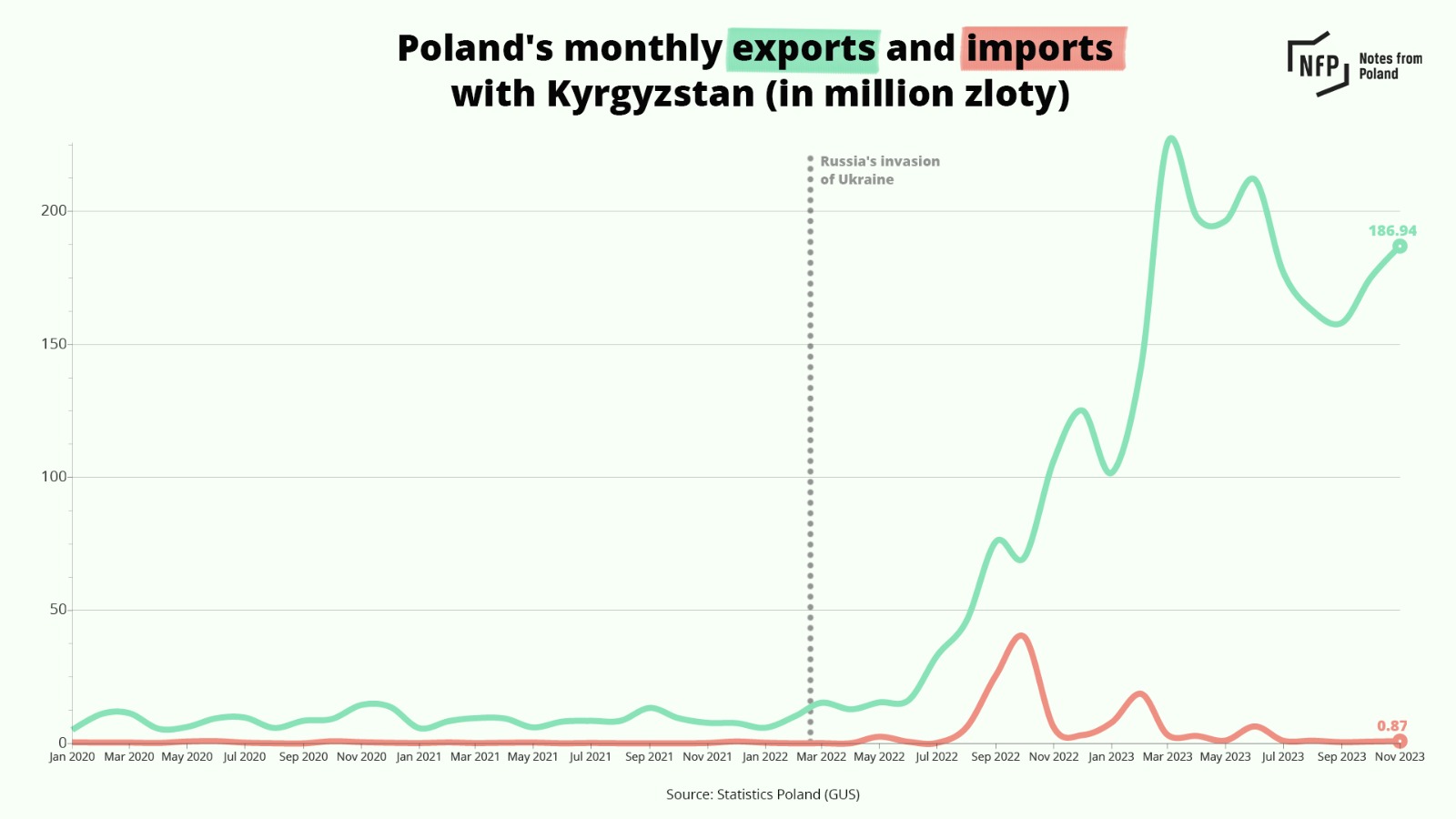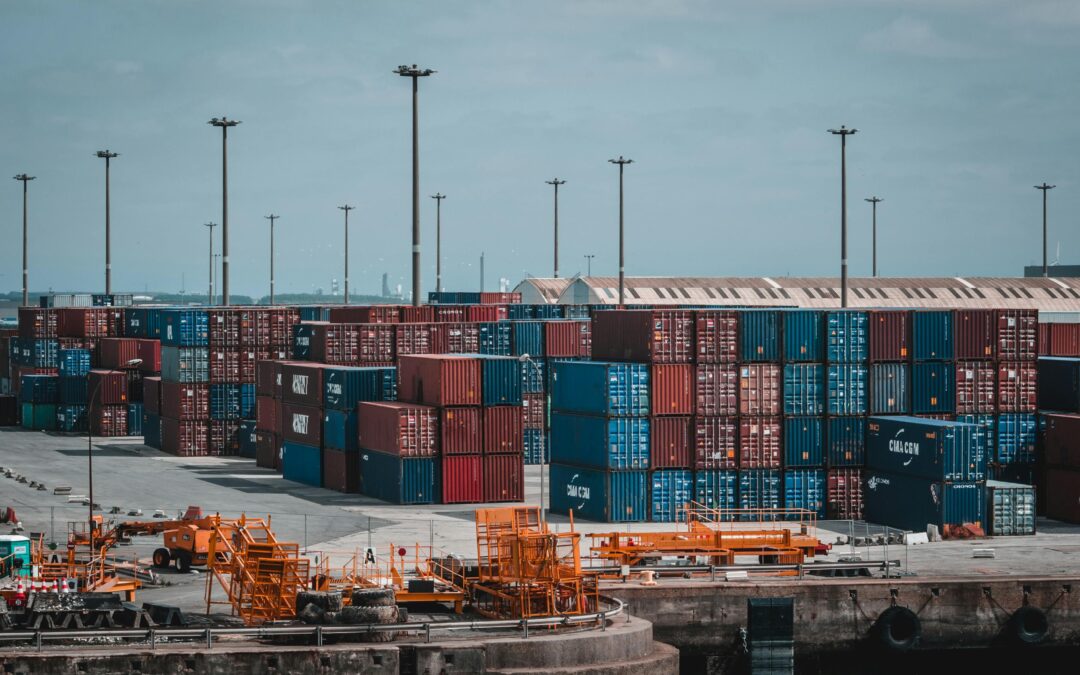Poland’s exports to Kyrgyzstan have increased more than 18-fold in the wake of Russia’s invasion of Ukraine. The Central Asian country is seen as a route to reach Russia, bypassing sanctions placed on direct exports to Moscow.
Other Western countries have also seen growing exports to Kyrgyzstan, but one economist notes that Poland and Germany’s figures are the largest.
In February 2022, the month that Russia invaded Ukraine, Poland exported goods worth 10.19 million zloty (€2.33 million at today’s exchange rate) to Kyrgyzstan, official data from Statistics Poland (GUS) show.
By November 2023, the last month for which data are available, the figure had reached 186.9 million zloty (€42.7 million), representing a rise of 1733% over that period.

During that time, Kyrgyzstan, a country of 7 million people, leapt from 119th to 49th place among Poland’s export destinations. The main products from Poland reaching Kyrgyzstan include cars, dishwashers and copy machines.
Kyrgyzstan’s share among Poland’s overall exports remains small at 0.14%. However, its increase from 0.01% in just 22 months has caught the eye of experts, who see this as evidence of businesses circumventing the sanctions imposed on Russia for its aggression against Ukraine.
“There’s no way that these goods are meant for domestic consumption in Kyrgyzstan,” said Robin Brooks, chief economist at the Institute of International Finance, commenting on Poland’s figures.
“They’re obviously heading for Russia, where they help keep Putin’s war economy running. The EU turns a blind eye,” he added.
Poland's exports to Kyrgyzstan are up 1900% since before Russia invaded Ukraine. There's no way that these goods are meant for domestic consumption in Kyrgyzstan. They're obviously heading for Russia where they help keep Putin's war economy running. The EU turns a blind eye… pic.twitter.com/oUGrQk7jUz
— Robin Brooks (@RobinBrooksIIF) January 10, 2024
Brooks has also highlighted that many other countries are using Kyrgyzstan as a route to evade sanctions on Russia, including Germany, Lithuania, Estonia, Latvia, Italy and the United States.
However, he notes that Poland and Germany have been the two largest exporters to Kyrgyzstan since Russia’s invasion of Ukraine and that “there is no sign whatsoever that these exports are slowing”.
The two biggest exporters to Kyrgyzstan – since Russia invaded Ukraine – are Germany (black) and Poland (blue). There is no sign whatsoever that these exports, which are surely going to Russia, are slowing. What is the EU doing? pic.twitter.com/4KoNpLV2cE
— Robin Brooks (@RobinBrooksIIF) January 23, 2024
In the entire year of 2022, Poland’s exports to Kyrgyzstan amounted to 532.5 million zloty (€121.65), up from 102.4 million zloty (€23.40) in 2021, representing an increase of 420% year-on-year. In the first 11 months of 2023, the figure reached nearly 2 billion zloty (€460 million).
Rises in exports from Poland over that period were also recorded by other countries in Asia. However, Kyrgyzstan’s was the largest.
The Polish Economics Institute (PIE), a state-linked think tank, noted late last year that while there had at that stage been a 22-fold rise in exports to Kyrgyzstan, the equivalent figures for Kazakhstan and Uzbekistan were around 2.5 and for Turkey 2.4, reports Business Insider Polska.
Poland remains by far the EU's biggest buyer of liquefied petroleum gas (LPG) from Russia, despite pledging to stop such imports.
Last year it spent €710 million on Russian LPG, which was almost two thirds of the total imported by EU countries https://t.co/d1kP2RcegD
— Notes from Poland 🇵🇱 (@notesfrompoland) April 4, 2023
Like Brooks, PIE says that “the changes have to do with routes to circumvent the sanctions imposed on Russia and Belarus after the invasion of Ukraine”.
Poland’s government has been among the most vocal international allies of Ukraine during the war, including calling for tougher sanctions to be imposed on Russia. That stance has been maintained by the new government, which took power last month.
However, Poland has also been accused of seeking to exploit gaps in the sanctions, including through continued imports to Poland of Russian liquefied petroleum gas and imports of Russian oil to the Czech Republic by Polish state energy giant Orlen.
The Czech Republic is importing its highest proportion of Russian oil since 2021, prompting protests in Prague.
But the government notes that it is Polish state firm Orlen – which owns the only two Czech oil refineries – that is responsible for imports https://t.co/yiW08598LM
— Notes from Poland 🇵🇱 (@notesfrompoland) September 13, 2023

Notes from Poland is run by a small editorial team and published by an independent, non-profit foundation that is funded through donations from our readers. We cannot do what we do without your support.
Main image credit: Samuel Wölfl / Pexels

Alicja Ptak is deputy editor-in-chief of Notes from Poland and a multimedia journalist. She has written for Clean Energy Wire and The Times, and she hosts her own podcast, The Warsaw Wire, on Poland’s economy and energy sector. She previously worked for Reuters.



















